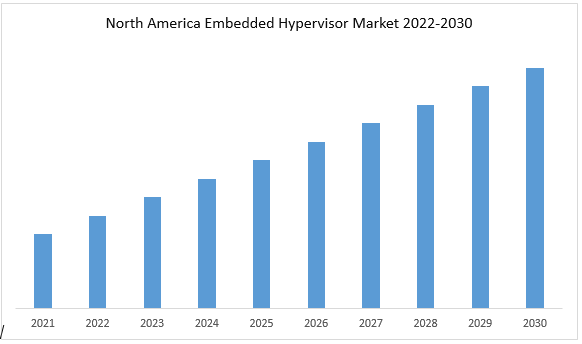Rising Need for Efficient and Flexible Solutions in Complex Embedded Systems is the Main Reason for the Growth of North America in the Embedded Hypervisor Market!
- Vikas Kumar
- July 12, 2023
- NEWS, TELECOM & IT
- 0 Comments
The demand for embedded hypervisor in the North America region has been steadily increasing over the past few years. The rapid growth of virtualization technology in various industries has led to a greater need for efficient and secure virtualization solutions. Embedded hypervisors offer the ability to run multiple operating systems or virtual machines simultaneously on a single hardware platform, enabling companies to maximize resource utilization and streamline their operations. Further on, the rise of edge computing and the Internet of Things (IoT) has further fueled the demand for embedded hypervisors in North America.
Access sample report (including graphs, charts, and figures): https://univdatos.com/report/embedded-hypervisor-market/get-a-free-sample-form.php?product_id=38788
As more devices and sensors are connected to networks, there is a greater requirement for robust and reliable virtualization solutions that can manage and secure these distributed systems effectively. Embedded hypervisors provide a foundation for managing and isolating different software components, enabling better control and security in edge computing environments. Additionally, the increasing emphasis on cybersecurity has made embedded hypervisors a sought-after technology. By utilizing hypervisor-based virtualization, companies can create secure partitions and isolation between different software components, protecting critical systems and sensitive data from potential attacks. This heightened focus on security has driven organizations across various sectors, including government, healthcare, finance, and manufacturing, to adopt embedded hypervisors as a fundamental part of their infrastructure.
North America Embedded Hypervisor Market Revenue (2020-2030) – USD Mn
For a detailed analysis of the Global Embedded Hypervisor Market browse through https://univdatos.com/report/embedded-hypervisor-market/
Based on component, the market is bifurcated into software and services. The software segment catered to a significant share of the market in 2021 owing to the increasing demand for embedded hypervisor software is driven by the need for system consolidation, real-time operation, mixed-criticality support, legacy system migration, security, and improved software development and testing capabilities in the embedded systems domain
On the basis of technology, the market is classified into desktop virtualization, server virtualization, and data center virtualization. Among these, the desktop virtualization segment catered to a significant share of the global embedded hypervisor market in 2021. The need for flexible and mobile work environments, enhanced security and data protection, cost savings and simplified IT management, improved disaster recovery capabilities, and support for diverse devices and operating systems are the major factors that contributed to the growth of this segment. These benefits make desktop virtualization an attractive solution for organizations aiming to boost productivity, increase data security, and streamline IT operations.
Global Embedded Hypervisor Market Segmentation
Market Insight, by Component
- Software
- Services
Market Insight, by Technology
- Desktop Virtualization
- Server Virtualization
- Data Center Virtualization
Market Insight, by Industry
- Information & Communication Technology
- Banking & Financial Services
- Aerospace & Defense
- Healthcare
- Others
Market Insight, by Region
- North America
- U.S.
- Canada
- Rest of North America
- Europe
- Germany
- UK
- France
- Italy
- Spain
- Rest of Europe
- APAC
- China
- India
- Japan
- Rest of APAC
- Rest of the World
Top Company Profiles
- Citrix Systems, Inc.
- IBM
- Microsoft
- VMware, Inc.
- Wind River Systems, Inc.
- NXP Semiconductors
- Thales
- Siemens
- Lynx Software Technologies
- acontis technologies GmbH



